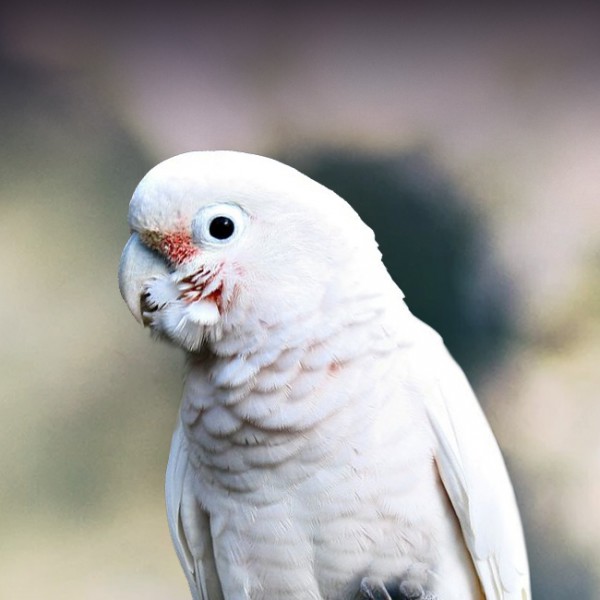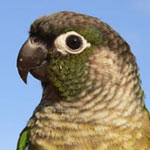I had a call on my answering machine when I got home today: “Hey, ummm, STANLEY just laid an egg. (laughter) One of us is really confused.” That really made me laugh. I clearly remember the day that my Henry laid a clutch of two. Sometimes this is how we find the true gender of our parrots. It’s that time of year. The bird talk boards have egg laying posts all over them. Someone I know just had to have what she called “the mother of all eggs” surgically removed from her cockatoo. It was HUGE!
The question that most commonly comes up is: how can a “single” parrot produce an egg? Egg production is not the consequence of mating. A female parrot will produce an egg because her body reacts to certain stimulus that tells her it is time to do so. In the wild, things like change of season, increased daylight hours and more availability to certain foods signal the breeding season.
In our homes, our parrots react to the same stimuli. The way that we physically handle them and even a bath (reminiscent of spring rainfall) can bring on the hormones which can result in egg laying. These eggs will not be viable, as there was no fertilization by a male, and will not produce babies.
Male Cockatiel laying eggs
Upon leaving the eggs, my male cockatiel appeared to be pushing the eggs of the female cockatiel away. He had been sitting on the eggs. Why is this?.
If both birds have laid eggs, then you definitely have two females. It is impossible for a male cockatiel to lay eggs. Removing the nest box and discouraging the birds from laying more eggs is the best course of action. They will literally lay eggs until it kills them. In order to avoid getting more females, I advise DNA testing to confirm the gender of any males you decide to get for these females. Males must be old enough, at least two years old. Additionally, you are limited to breeding one pair of birds per cage. In essence, this female has taken the other’s nest and is trying to clear the eggs to make room for her own. She might break and start eating the eggs if you don’t take the box away, which is a bad habit that could spread to her own eggs. When a hen acquires this behavior, it typically ends her chances of ever being a successful breeder. I recommend making the following adjustments to stop the egg laying until you get males and split the pairs.
All of these actions are necessary to deter egg laying. Remember that in order for her to lay eggs, she requires longer days, warmer temperatures, an abundance of food supply, and a peaceful, private space. Your goal is to reverse these conditions.
Cover the cage early every evening to limit her light exposure to 8 or 10 hours.
Give her nothing to use as a nest, such as boxes, bowls, bird huts, or tents. Take out the food bowl if she chooses to sit in it and replace it with smaller cups.
Give her nothing to shred, like cardboard or paper.
Rearrange the toys in the cage frequently.
Move the cage to a different place in the room. Once a week or whenever she exhibits nesting behavior, such as settling on the cage floor, move the cage. Her vision of having a secure location to lay eggs and raise chicks is upset by this.
If you feed a lot of fresh foods, give them up for a few weeks, and then only give them in moderation, perhaps twice or three times a week. Normal feeding can be resumed later, once the birds have stopped acting hormonally.
When she is released from the cage, keep her out of any cozy, dark areas and restrict her freedom of movement.
When interacting with her, refrain from petting her anywhere other than her head and neck. Only a bonded mate is allowed to groom the body. Please refrain from touching my body; we are not a couple.
If the cage tray isn’t covered with a metal floor grate, leave it bare and give it a daily cleaning instead of using any bedding or paper.
Thank you for asking Lafeber,
Brenda Have a question?
- Question Title*
- Question*
- Your Name*
- Email*
- Phone: This field should remain unchanged as it is only used for validation.
Questions by category










Egg binding is a medical emergency that needs to be treated right away. It can be caused by obesity, large or poorly formed eggs, poor diet, or even faulty genes. This is not uncommon with cockatiels, lovebirds and budgies. Lethargy, sitting at the bottom of the cage, large or excessive droppings, or none at all, straining, standing or perching with the legs apart more than is typical, or a swollen vent area are all indications of egg binding. With the help of warmth, lubrication, and injections of fluids, calcium, antibiotics, and steroids, the veterinarian can frequently “coax” the bird.
You can alter your surroundings to discourage your parrot from laying eggs, whether it’s an excessive or non-existent habit. Keep her away from enclosed, dark spaces that might be mistaken for nesting locations. Limit her daylight hours to 8 – 10 per day. Avoid warm, mushy foods like mashes. Bathe her less frequently.
Let your lone female parrot keep it (or them) for a few days if there’s no chance this is a viable egg. Like a devoted mother, she might decide to nurture and tend to it. If she doesn’t show interest after a while, take it away from her while she’s away. Eliminating the egg right away will only encourage her to naturally lay more to replace it, which may result in health issues. Some decide to take out the eggs immediately and swap them out for plastic eggs or pebbles of a comparable size. Oddly enough, they frequently don’t appear to notice and carry on incubating them.
The egg may occasionally be felt out (but only by your veterinarian); take extreme caution not to crack the shell. Occasionally, a needle is used to remove the egg’s contents, and the shell is crushed so it can be passed, depending on where the egg is located. A potentially fatal condition known as egg yolk peritonitis can result from the egg breaking or disintegrating inside the abdomen. All of these are excellent arguments against allowing your parrot to overproduce eggs.
Be careful to touch her around the head and neck only, and if she has a favorite toy that she is behaving sexually with, remove it. Be mindful of her diet. If she is laying excessively, and until you get it under control, she needs nutrients to handle the task. An all seed diet will not provide her with the calcium she will be needing. If these methods don’t work your vet might choose to administer hormones.
FAQ
Can males lay eggs?
Can birds lay eggs without mate?
Why did my male cockatiel lay an egg?
Can a male cockatoo lay an egg?